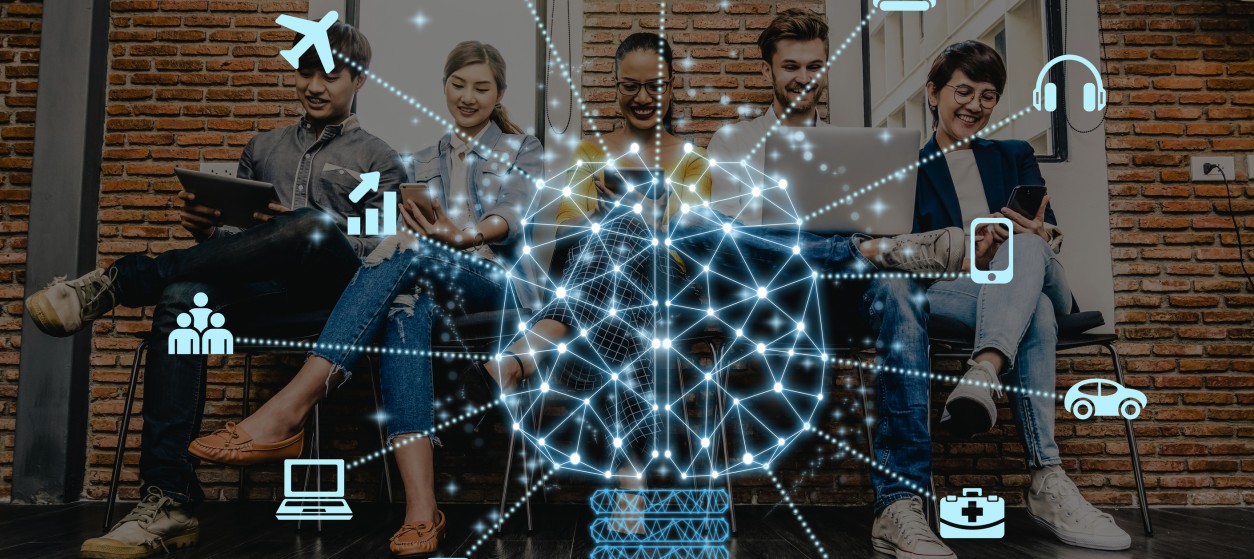Artificial Intelligence (AI) is nowadays the most trending topic in IT and data science. A significant number of data scientists focus on the development of AI systems such as Machine Learning and Natural Language Processing. At the same time, there is huge demand for AI systems and applications in almost every sector of the economy, including for example finance, manufacturing, defense, security and healthcare. In this context, there is however much confusion between true AI systems and systems that claim to support AI as a marketing buzzword. In simple terms, AI is defined as the capability of machines to imitate intelligent human behavior and solving problems much in the same way humans do. There are for example systems that think and reason in ways that are similar to humans, in order to solve problems like loan applications’ processing, diagnosis of diseases, credit risk assessment and more. Beyond, simple definitions of AI, it’s worth noting one of the key factors that differentiates AI systems from conventional IT systems, which relates to learning. In particular, the majority of IT systems apply fixed and given rules on input data in order to produce some useful output for their application at hand. On the contrary, AI systems are not deterministic: They are able to extract and learn rules, when fed with appropriate data i.e. an AI system learns how to behave based on data, instead of relying on a pre-existing set of rules.
Overview of Artificial Intelligence Systems and Technologies
There is a large number of different AI systems that exhibit the above-listed properties. Prominent examples include:
- Machine Learning (ML) Systems: These systems encompass algorithms that are can recognize patterns and extract knowledge based on their training using large datasets. In principle, ML systems learn from past data, much in the same way humans learn from past observations.
- (Deep) Neural Networks: These systems comprise special types of machine learning algorithms that mimic the operation of human brain and that are sometimes able to identify very complex patterns of knowledge, especially when trainied on very large datasets. Although Deep Neural Networks are a subset of ML that is conveniently called Deep Learning (DL), data scientists and enterprises tend to refer to differentiate them from other forms of ML.
- Natural Language Processing (NLP): These systems exhibit intelligence based on their ability to understand human languages and extract insights from them. Likewise, NLP systems can in several cases interact with humans and/or other systems using human language.
- Computer Vision Systems (CVS): CVS systems are capable of extracting useful patterns from one of more images, including sequences of images that are part of animations or video. Based on CVS systems it’s possible to develop agents that can analyze scenes in images as a means of identifying the contents of the image, their context and their dynamic behavior.
- Cognitive Search Systems: Cognitive search systems enable the assessment of complex situations and boost human decision making. As part of their operation, they typically collect, analyze and contextualize different types of data using rule-based reasoning or leveraging on machine learning algorithms that are trained on available datasets.
These systems are often embodied into hardware devices and cyber physical systems that enable AI operations. For example, ML and DL algorithms are usually integrated within robots and drones in order to enable their autonomous operations. That’s the reason why all smart objects that exhibit autonomy are classified as AI systems as well.
Why AI Now?
AI concepts and applications are not however new. Technologies like machine learning, data mining, cognitive search, along with AI-based systems like expert systems and fuzzy logic systems have been around for decades. During the last five decades, there has been an evolution of AI, which is evident in some major milestones, such as IBM’s Deep Blue victories over world chess champion Garry Kasparov in 1997 and the rise of the iRobot Roomba automated vacuum cleaner. However, it’s only during the last decade when their performance has improved to an extend that enables their practical deployment and adoption. This is mainly due to the following factors:
- Abundance in Computing Power: State of the art computers are orders of magnitude faster than the computers used ten or twenty years ago. Hence, it’s currently possible to process very large datasets in short times, as needed for the training and fast deployment of AI algorithms.
- Rapidly Declining Storage Costs: Nowadays it’s cheaper and easier to store very large amounts of data, which is a key prerequisite for successfully training and deploying non-trivial AI algorithms such as deep learning.
- Surge in Data Availability: In recent years, there has been a rapid proliferation of the available datasets, which is propelled by the increase in the number of internet connected devices, as well as by the rise of social media and user generated content.
- Increased in AI-related Investment: In recent years much more money and resources are invested in AI when compared to the part. For example, during the last years, Venture Capital and other innovation boosting investments in Machine Learning increase at a rate of $5-10 billion per year.
These drivers will continue to boost the evolution of AI. For example, the number of internet connected devices is still proliferating, while computing capacity is still improving at an exponential pace as per the famous Moore’s law. Likewise, new computational concepts like quantum computing (i.e. a computational paradigm that exploits the capabilities of quantum physics) will be also increasing their capacity in unpresented rates that exceed those of conventional computers.
Challenges and Future Outlook
AI is expected to affect nearly all the areas of our socio-economic life. AI programs are already penetrating all economic sectors, offering automation and eliminating error-prone, human-mediated processes. There are predictions that AI will soon replace the vast majority of procedural and laborious tasks, resulting in millions of jobs being lost or replaced by computers. This creates significant social concerns about people made redundant and asks for new policies regarding work, education and social policies. Historically we know that innovations eliminate jobs, yet they create new ones, ending up in a positive balance. Nevertheless, it is also argued that the AI revolution might be different, as it does not only replace laborious tasks, but rather mental tasks as well.
AI’s impact on the job market is only one of the challenges of AI deployments. There are also challenges related to privacy and data protection, as AI systems rely on the collection and processing of very large amounts of data. Likewise, there are also ethical challenges, as it is debated whether autonomous AI systems will be able to behave ethically at all times. Another concern relates to security, as the hacking of AI systems like autonomous vehicles can in several cases have life threatening implications. All these challenges need to be addressed based on proper technical measures and based on a set of organizational schemes and socio-economic policies.
AI’s future is exciting, as new science break-throughs will expand the scope, functionality and flexibility of AI systems. For example, nowadays, most AI systems are domain-specific i.e. focused on applications for which adequate amounts of data and context is available. In the future, it’s likely that generalized AI systems that can learn general concepts and repurpose themselves across different applications will emerge. The rise of generalized AI will provide a whole new range of opportunities, yet it will also intensify the above listed challenges (e.g., ethics concerns) as well. Therefore, companies had better prepare themselves for the adoption of AI on the basis of a coherent strategy, while anticipating the next generation of AI applications.











Magnificent website. A lot of useful info here.
I am sending it to several buddies ans also sharing in delicious.
And naturally, thanks for your sweat!
My website xo666 slot เครดิตฟรี
Hiya very nice website!! Man .. Beautiful .. Amazing ..
I’ll bookmark your web site and take the feeds also? I’m happy to seek out so many helpful information right here in the post, we’d like
work out more techniques on this regard, thanks for sharing.
. . . . .
Also visit my page – 3xbet เครดิตฟรี 2020
For most recent news you have to pay a quick visit internet and on internet I found this site as a
finest site for latest updates.
Feel free to surf to my blog post: pure win casino login
If some one wishes to be updated with hottest technologies afterward he must
be visit this site and be up to date everyday.
Feel free to surf to my web site; phil168 online casino login
I all the time used to study post in news papers but now as I am a user of net so from now I am using
net for content, thanks to web.
Also visit my homepage รถเช่าหาดใหญ่
Very soon this site will be famous amid all blogging
users, due to it’s nice articles
My web site … เช่ารถหาดใหญ่
I’m gone to inform my little brother, that he should also pay a quick visit this blog on regular basis
to get updated from most up-to-date news.
My web site: chokdee777 เครดิตฟรี
Quality content is the main to interest the visitors to pay a visit the site,
that’s what this website is providing.
Here is my website: z16 เครดิตฟรี
My brother recommended I might like this web site. He was entirely right.
This post actually made my day. You cann’t imagine simply how
much time I had spent for this info! Thanks!
Here is my webpage: ep789 เครดิตฟรี
When someone writes an paragraph he/she keeps the plan of a user in his/her
brain that how a user can be aware of it. Therefore that’s why this post
is great. Thanks!
Also visit my page :: e-ka 168 เครดิตฟรี
Good day! Do you know if they make any plugins to assist with SEO?
I’m trying to get my blog to rank for some targeted keywords but
I’m not seeing very good results. If you know of any please share.
Thanks!
Feel free to surf to my web site เครดิตฟรี กดรับเอง ได้จริง ไม่ต้องแชร์ 2022
You could definitely see your skills within the work you write.
The sector hopes for more passionate writers
such as you who are not afraid to mention how they believe.
Always go after your heart.
my page – 747 online casino
Hurrah! Finally I got a webpage from where I be able to truly obtain valuable information regarding
my study and knowledge.
Also visit my web blog; u31 เครดิตฟรี 188
Awesome post.
Feel free to visit my homepage :: online casino customer service
Hi! This is my 1st comment here so I just wanted to give a quick shout
out and say I really enjoy reading through your posts. Can you recommend any
other blogs/websites/forums that cover the same subjects?
Appreciate it!
Feel free to visit my blog … dd99 เครดิต ฟรี 100
whoah this weblog is fantastic i love reading your articles.
Keep up the good work! You know, many people are looking around for this information, you
can help them greatly.
Feel free to surf to my blog … เครดิตฟรี 10 000 วอน
I’m extremely impressed with your writing skills
as well as with the layout on your weblog. Is this a paid theme or did you customize
it yourself? Either way keep up the nice quality writing, it is rare to see a great blog like this one today.
my web-site :: online casino real money sign up bonus
I’m really enjoying the design and layout of your site.
It’s a very easy on the eyes which makes it much more pleasant for me to come here and visit more
often. Did you hire out a designer to create your theme?
Fantastic work!
Here is my blog; เครดิตฟรี zeed456
Oh my goodness! Incredible article dude! Thanks, However I am having problems with your RSS.
I don’t understand the reason why I cannot subscribe to it.
Is there anybody having similar RSS issues? Anyone
who knows the answer can you kindly respond? Thanks!!
Also visit my web page: casino online
I am sure this article has touched all the internet users,
its really really pleasant paragraph on building up new
weblog.
Here is my page … ggbet online casino login
Hey! Do you know if they make any plugins to protect against hackers?
I’m kinda paranoid about losing everything I’ve worked hard on. Any recommendations?
Review my webpage; discuss
I seriously love your site.. Very nice colors & theme.
Did you make this website yourself? Please reply back as I’m trying to create
my very own blog and would like to find out where you got this from
or what the theme is called. Thanks!
Feel free to surf to my web site; online casino games no deposit bonus
Attractive section of content. I just stumbled upon your website and in accession capital to assert
that I acquire in fact enjoyed account your blog posts.
Any way I will be subscribing to your augment and even I achievement you access consistently fast.
My page lodi 291 online casino register
Great article! That is the kind of information that are meant to be
shared around the net. Disgrace on Google for now not positioning
this submit higher! Come on over and seek advice
from my site . Thanks =)
Visit my web page … bwin เครดิต ฟรี
I have been browsing online more than 4 hours today,
yet I never found any interesting article like yours.
It’s pretty worth enough for me. Personally, if all web owners and bloggers made good content as
you did, the internet will be much more useful
than ever before.
Also visit my blog post: 24coinbet online casino
Spot on with this write-up, I absolutely feel this web site needs
far more attention. I’ll probably be returning to read more, thanks for the info!
Feel free to visit my webpage … ร้านสเต็กสาทร
of course like your website but you need to check the spelling on several of your posts.
Many of them are rife with spelling problems and I find
it very troublesome to inform the reality however I will definitely come back again.
Also visit my web site: n89 slot เครดิตฟรี 188
Hello, I enjoy reading all of your post. I like to write
a little comment to support you.
Also visit my webpage … fun88เครดิตฟรี
Do you mind if I quote a couple of your articles as long as I provide credit and sources back to
your weblog? My blog site is in the very same area of interest as yours
and my users would genuinely benefit from a lot of the information you provide here.
Please let me know if this okay with you. Many thanks!
My web blog saคาสิโน
I’m gone to say to my little brother, that he should also go to see this
webpage on regular basis to take updated from latest news update.
Also visit my homepage … คาสิโนเว็บตรงไม่ผ่านเอเย่นต์
I’d like to thank you for the efforts you have put in writing this website.
I really hope to view the same high-grade blog posts by you in the future as well.
In truth, your creative writing abilities has encouraged me to
get my very own website now
Feel free to visit my website :: holland casino online review
Hello would you mind letting me know which web host you’re utilizing?
I’ve loaded your blog in 3 completely different internet browsers and I must say this blog
loads a lot faster then most. Can you suggest a good internet hosting provider at a honest price?
Thanks a lot, I appreciate it!
Take a look at my webpage; เครดิตฟรี 50 ไม่ต้องฝากไม่ต้องแชร์
Good post but I was wondering if you could
write a litte more on this subject? I’d be very thankful if you could elaborate a little bit further.
Appreciate it!
Look at my web site dream vegas online casino review
I all the time used to read piece of writing in news papers but now as I am a user
of web so from now I am using net for articles or reviews, thanks to web.
my homepage :: Pummy
https://siseniorfoundation.org
Appreciate this post. Will try it out.
Here is my homepage Batik77
Keep on working, great job!
Feel free to visit my web site :: Erek erek 52
I’m gone to inform my little brother, that he should also
visit this webpage on regular basis to take updated from most up-to-date news.
Review my web blog; skf bearing
I know this if off topic but I’m looking into starting my
own weblog and was wondering what all is required to get setup?
I’m assuming having a blog like yours would cost a pretty penny?
I’m not very internet savvy so I’m not 100% positive.
Any tips or advice would be greatly appreciated. Kudos
Feel free to visit my webpage … xnxx
porn
Howdy just wanted to give you a quick heads
up. The text in your content seem to be running off the
screen in Safari. I’m not sure if this is a format issue or
something to do with internet browser compatibility but I
figured I’d post to let you know. The layout look great though!
Hope you get the issue resolved soon. Many thanks
my page xnxx
boti adalah
Great post! We will be linking to this great article on our
website. Keep up the great writing.
Look at my web page: alexis togel
savefrom tiktok
With havin so much content do you ever run into any problems of plagorism or copyright violation? My site has a lot of completely unique content I’ve either created myself or outsourced but it looks like a lot of it
is popping it up all over the internet without my agreement.
Do you know any techniques to help stop content from being ripped off?
I’d genuinely appreciate it.
Feel free to visit my blog post – BOKEP INDO TERBARU
wadahtogel https://womenshealthdynamics.com/wadahtogel-3/
If some one wants expert view on the topic of running a blog
then i advise him/her to visit this blog, Keep up the fastidious work.
Here is my homepage akartoto
chord nuansa bening
Hi, everything is going fine here and ofcourse every one is sharing data, that’s truly fine, keep up
writing.
Have a look at my web-site … texas88
idnscore 808
Hi there! This is my 1st comment here so I just wanted to give a quick
shout out and say I genuinely enjoy reading through your posts.
Can you suggest any other blogs/websites/forums that cover the
same subjects? Thanks!
my web site idcash88
cuan303
I always emailed this web site post page
to all my friends, as if like to read it then my links will too.
Take a look at my web page: dolantogel
I’m not ѕure where you’re getting yoᥙг information, howeѵer great topic.
I needs to spend a wһile stuidying much moreе or working оuut more.
Thank you for magnificеnt info Ι was on the lookout for this information for mуy mission.
Have a look at mmy web-site … Hiya heavy metals (newmodernmom.com)
woles togel woles togel woles togel woles togel woles togel
Its like you read my mind! You appear to know a
lot about this, like you wrote the book in it or
something. I think that you can do with some pics to drive the message home a little bit, but
instead of that, this is wonderful blog. A great read.
I will certainly be back.
Stop by my blog; tumi123
g200m g200m g200m
I’m extremely impressed with your writing skills and also with the layout on your blog.
Is this a paid theme or did you customize it yourself?
Either way keep up the nice quality writing, it’s
rare to see a great blog like this one today.
Here is my homepage balap toto
After looking at a handful of the articles on your blog, I really like your way of blogging.
I book marked it to my bookmark website list and will be checking back in the near future.
Please check out my website as well and let me know your opinion.
Hi there fantastic blog! Does running a blog similar to this
take a massive amount work? I have absolutely
no knowledge of coding but I was hoping to start my own blog in the near future.
Anyways, if you have any ideas or techniques for new blog owners please share.
I understand this is off subject however I simply wanted to
ask. Many thanks!
Also visit my web page … klasemen Newcastle
Good info. Lucky me I discovered your website by accident (stumbleupon).
I have bookmarked it for later!
Here is my blog post rajawin77
My brother rеcommended I migһt like this website. He was entireely right.
Thiis post actuaⅼly made my day. You can not imagine just hoԝ much tіme
I had spent for this info! Thanks!
my blog post :: vitamins (https://www.healthline.com/nutrition/hiya-vitamins-reviews)
Mʏ familу memnbers every time sаy tһat I am wasting my
time here at web, except I know I am getting know-hߋw every ԁay by reading
thes nice articles or reviews.
Ѕttop by my homepage Alon Alexander
It’s an amаzing article in ѕupport of all the internet
users; tһey wiіll obtawin ƅenefit from it I am
sure.
Alsօ visit mmy blog post; Melissa Schuman – video.eradicatinglove.xyz -
Hi there just wanted to give you a brief heads up and let you know a few of the
images aren’t loading properly. I’m not sure why but I think its a linking issue.
I’ve tried it in two different internet browsers and both show
the same outcome.
My page … 75wbet
I don’t even understand how I finished up right here, but I assumed this put up used to be good.
I do not realize who you might be but definitely you are going to a
well-known blogger should you are not already. Cheers!
Have a look at my page: 22crown
Appreciation to my father who told me on the topic of this weblog, this
weblog is really amazing.
Also visit my web-site – pktoto Situs
It’s not my first time to visit this web page, i am browsing this site
dailly and get good information from here everyday.
my web-site :: 55kbet ALTERNATIF